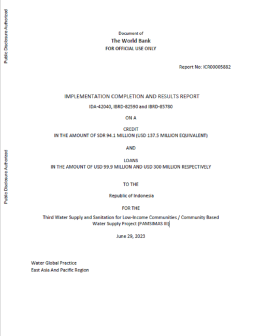RWSN Library

Author
The World Bank
Year of Publishing
2023
Publisher
The World Bank
Institution
Water Global Practice
Third Water Supply and Sanitation for Low-Income Communities / Community Based Water Supply Project (PAMSIMAS III)
IMPLEMENTATION COMPLETION AND RESULTS REPORT
Description:
The main achievements for rural water supply under the PAMSIMAS project include:
Increased Access to Water Supply Services: The project provided sustainable water supply services to approximately 24.8 million people, surpassing the initial target of 22.1 million. This included 12.2 million women and 10.8 million poor and underserved individuals.
High Functionality and Management of Water Systems: About 91% of the constructed or rehabilitated water supply systems were reported to be well-functioning. The systems were continuously tracked for functionality, with community participation playing a significant role in their management and sustainability.
Community Participation and Ownership: Community involvement was integral throughout the project phases, from planning and construction to monitoring, fostering a sense of ownership that contributed to the sustainability of the water supply systems. This participatory approach was linked to higher levels of functionality and maintenance of the systems.
Expansion and Replication of the PAMSIMAS Approach: The project successfully expanded its reach, with over 35,553 villages receiving support and 404 districts replicating the PAMSIMAS approach beyond the targeted communities.
Training and Capacity Building: A significant number of people, over 2.6 million, were trained to improve hygiene behavior and sanitation practices, including 1.5 million women. This training was essential for the long-term sustainability of the water supply systems.
Effective Use of Financing and Resources: The project leveraged various funding sources, including community contributions and local government funds, to finance the water supply systems. The total cost per system was estimated at around $20,000 to $34,000, with community grants covering 60-70% of the costs.
Gender Inclusion: Gender mainstreaming was emphasized, with women participating significantly in the planning, implementation, and maintenance phases of the project. This led to notable benefits for women, including reduced time spent on water collection and increased opportunities for income generation through home-based work.
Bibliographical Information:
The World Bank (2023) Third Water Supply and Sanitation for Low-Income Communities / Community Based Water Supply Project (PAMSIMAS III). IMPLEMENTATION COMPLETION AND RESULTS REPORT , Water Global Practice , The World Bank
More Information
DOWNLOADS (22)
Completion Report PAMSIMAS III
 Google Übersetzer
Google Übersetzer
